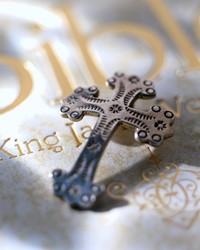How Do You Treat Your Bible?
Compare the detailed and careful treatment of the Torah to the manner in which some Christians treat their Bibles. Most Christians have many Bibles and translations available that are often strewed randomly throughout the house, buried under piles of magazines, or accumulating dust on a shelf, undisturbed for days on end. Other Bibles are permanent fixtures in the pew racks of local churches and are opened briefly each Sunday morning when the pastor reads his sermon text.
When you consider the high price paid to translate and print the Bible, you will experience fresh gratitude for God’s Word. In the 1380s, Oxford scholar Wycliffe, opposing the organized religions of his day, handwrote a manuscript of the Bible. His followers, called the Loddards, translated and copied by hand hundreds of Bibles.
Forty-four years later, the pope dug up the bones of Wycliffe and had them scattered. John Hus, a follower of Wycliffe, continued the work of copying God’s Word. He was burned alive, with pages from a Wycliffe Bible used for kindling the fire, according to research. For some, the price of translating the Scripture was martyrdom.
Today in some Islamic countries, a believer could be beheaded or arrested for reading or preaching from a Bible. In Communist nations such as China, believers have been incarcerated and tortured if found reading or studying a Bible. In 1990, I met a minister from Bulgaria who, while under Communism, possessed only one page from a Bible, which was John 11. For years he preached to his small, secret group of twelve believers, reading the same message each week-the resurrection of Lazarus. To him this one page was priceless.
Christians must take a lesson from our Jewish friends and treat our Bibles with dignity and respect as we would a living person. After all, Paul proclaimed that the “Word of God is living and powerful” (Heb. 4:12).












































